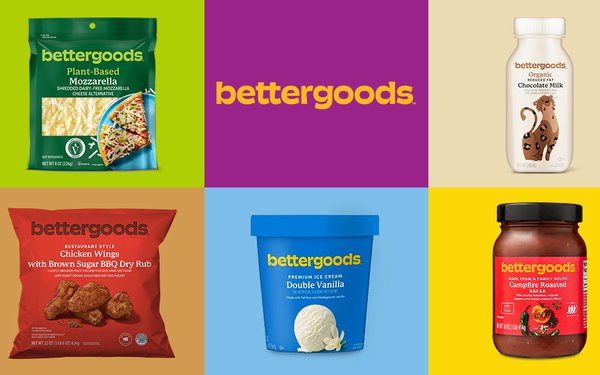
Image above: Bettergoods is Walmart's premium store brand line.
Whether it’s Kirkland Signature at Costco, 365 at Whole Foods or Maker’s Mark at
Sam’s Club, private label products keep nibbling away the market share of national brands. And while CPG marketers often assume that much of that erosion—constantly reflected in sales
declines at large companies—is due to consumer reaction to rising grocery costs, new research from FMI finds that shoppers increasingly choose these store brands for reasons that go beyond
price. Quality and innovation are now part of the appeal.
“They're now a key driver of customer loyalty and a way for retailers to stand out,” writes Tom Cosgrove, director of
industry relations at FMI. The research shows retailers view private-label launches as one of the most important innovation tools at their disposal. As they get more sophisticated in tapping trends
like better-for-you, premium and convenience, national brands have to hustle more to keep up.
advertisement
advertisement
Almost half of retailer respondents in this year’s survey said they are well along in using
private brands as a differentiator, up from 36% last year. And 86% plan to moderately or significantly increase private brand investments in the next two year. That push is expected to drive private
label dollar share to an average of 25.6%, a 15% jump from current levels.
The nature of that investment is also shifting. Nearly all retailers introducing new lines this year are focusing on
the premium tier, making up more than 90% of planned launches. Better-for-you claims are also common, with 85% tying new store brands to health or wellness. For national brands, that signals the
erosion of once-safe territory. If private labels win on price and premiumization, the differentiation gap narrows.
Marketing is another front where store brands are flexing new muscle.
Time-honored tactics like end caps, in-store signage and circulars are still in play. But private labels are now promoted with the same arsenal as name brands, competing for attention as well as shelf
space. Some 94% of retailers use social media to promote private label, 63% deploy influencer campaigns, and 38% buy retail media network ads.
Supply chain strength, once a weakness of private
labels, is also improving. This year’s survey highlights longer-term supplier commitments and new sourcing strategies as key priorities. Online availability has surged, with about 85% of private
brand assortments now available online, positioning retailers well as ecommerce continues to outpace in-store growth.
Analysts caution that challenges remain, especially pricing
pressure, supply risks, and the need for continued investment. But FMI’s forecast underscores the structural shift: Private brands aren’t just a stopgap in inflationary times. They are
steadily becoming one of the food industry’s fastest-growing categories, backed by deliberate retailer strategies in premiumization, marketing and supply.
For national brands, that means
private label is no longer the quiet, bottom-shelf competitor. It’s an increasingly polished rival that’s winning loyalty and share—and forcing even the biggest CPG names to rethink
how they define value, quality and innovation.